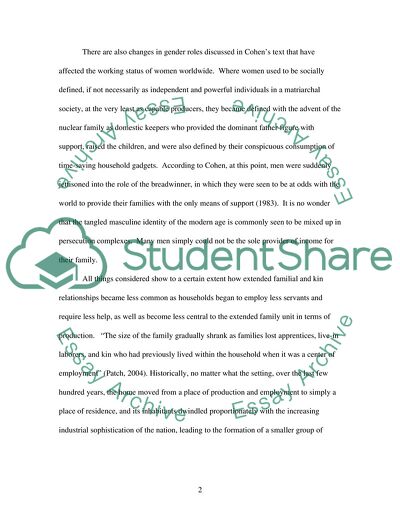
- Home
- Free Samples
- Premium Essays
- Editing Services
- Extra Tools
- Essay Writing Help
- About Us
- Studentshare
- Subjects
- Miscellaneous
- America's Industrilization process has resulted in more work for women
America's Industrilization process has resulted in more work for women - Essay Example

- Subject: Miscellaneous
- Type: Essay
- Level: Masters
- Pages: 4 (1000 words)
- Downloads: 0
- Author: mohamed76
Extract of sample "America's Industrilization process has resulted in more work for women"
As industrialization advanced, so did the statue of women, resulting in higher expectation for the mothers at home, but also higher expectations of the active-working women, both considered as one. Tracing the history of the nuclear family, Cohen notes how men left agriculturally based economies as a result of cash needs, in order to become industrial wage earners in places like factories. Factories streamlined labor during this time because they provided steady and dependable wages, not ones that were subject to drought and swarms of bugs eating the factories.
Workers felt more secure, and were often paid more, even though conditions were poor. At this point, according to Cohen, while children went to school, this left the mother of the family at home alone with labor-saving devices, and no real expectations. The author notes how even today, women spend too much time in a lonely domestic role (Cohen, 1983) There are also changes in gender roles discussed in Cohen’s text that have affected the working status of women worldwide. Where women used to be socially defined, if not necessarily as independent and powerful individuals in a matriarchal society, at the very least as capable producers, they became defined with the advent of the nuclear family as domestic keepers who provided the dominant father figure with support, raised the children, and were also defined by their conspicuous consumption of time-saving household gadgets.
According to Cohen, at this point, men were suddenly jettisoned into the role of the breadwinner, in which they were seen to be at odds with the All things considered show to a certain extent how extended familial and kin relationships became less common as households began to employ less servants and require less help, as well as become less central to the extended family unit in terms
...Download file to see next pages Read More
- TERMS & CONDITIONS
- PRIVACY POLICY
- COOKIES POLICY